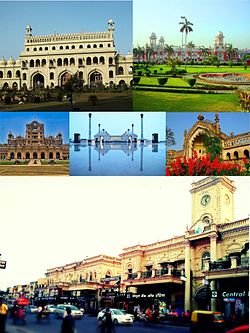Lucknow, India
|
Lucknow लखनऊ |
|
|---|---|

Clockwise from top: Bada Imambara, Charbagh Railway Station, Rumi Darwaza, Hazratganj, La Martiniere School, Ambedkar Memorial Park.
|
|
| Nickname(s): The City of Nawabs, The Golden City of India, Constantinople of the East, Shiraz-e-Hind | |
| Location of Lucknow in Uttar Pradesh | |
| Coordinates: 26°48′N 80°54′E / 26.8°N 80.9°ECoordinates: 26°48′N 80°54′E / 26.8°N 80.9°E | |
| Country |
|
| State | Uttar Pradesh |
| District | Lucknow |
| Government | |
| • Type | Mayor–Council |
| • Body | Lucknow Municipal Corporation |
| • Mayor | Dinesh Sharma |
| • Municipal Commissioner | R.K. Singh |
| • MP | Rajnath Singh (BJP) |
| Area | |
| Area rank | 10th |
| • Metropolitan | 2,528 km2 (976 sq mi) |
| Elevation | 123 m (404 ft) |
| Population (2011) | |
| • Metropolis | 2,817,105 |
| • Rank | 11th |
| • Metro | 2,902,920 |
| Demonym(s) | Lakhnawi, Lucknowite |
| Time zone | IST (UTC+5:30) |
| PIN | 2260xx / 2270xx |
| Telephone code | +91-522 |
| Vehicle registration | UP 32 |
| GDP | $22 billion |
| Sex ratio | 915 ♀/♂ |
| Languages | Hindi, Urdu, English |
| Website | Official website |
| Population growth | |||
|---|---|---|---|
| Census | Pop. | %± | |
| 1871 | 284,800 |
—
|
|
| 1881 | 261,300 | -8.3% | |
| 1891 | 273,000 | 4.5% | |
| 1901 | 264,000 | -3.3% | |
| 1911 | 259,800 | -1.6% | |
| 1921 | 240,600 | -7.4% | |
| 1931 | 274,700 | 14.2% | |
| 1941 | 387,177 | 40.9% | |
| 1951 | 496,900 | 28.3% | |
| 1961 | 595,400 | 19.8% | |
| 1971 | 814,000 | 36.7% | |
| 1981 | 1,007,604 | 23.8% | |
| 1991 | 1,669,204 | 65.7% | |
| 2001 | 2,245,509 | 34.5% | |
| 2011 | 2,902,601 | 29.3% | |
| source: | |||
Lucknow (![]() i/ˈlʌknaʊ/ Lakhna'ū) is the largest and capital city of the Indian state of Uttar Pradesh. A major metropolitan city of India, Lucknow is the administrative headquarters of the eponymous District and Division and the capital of the state of Uttar Pradesh. It is the second largest city in north India, after Delhi . It is also the largest city in Uttar Pradesh. Lucknow has always been known as a multicultural city that flourished as a North Indian cultural and artistic hub, and the seat of power of Nawabs in the 18th and 19th centuries. It continues to be an important centre of governance, administration, education, commerce, aerospace, finance, pharmaceuticals, technology, design, culture, tourism, music and poetry.
i/ˈlʌknaʊ/ Lakhna'ū) is the largest and capital city of the Indian state of Uttar Pradesh. A major metropolitan city of India, Lucknow is the administrative headquarters of the eponymous District and Division and the capital of the state of Uttar Pradesh. It is the second largest city in north India, after Delhi . It is also the largest city in Uttar Pradesh. Lucknow has always been known as a multicultural city that flourished as a North Indian cultural and artistic hub, and the seat of power of Nawabs in the 18th and 19th centuries. It continues to be an important centre of governance, administration, education, commerce, aerospace, finance, pharmaceuticals, technology, design, culture, tourism, music and poetry.
The city stands at an elevation of approximately 123 metres (404 ft) above sea level and the metropolitan area covers an area of 2,528 square kilometres (976 sq mi). Bounded on the east by Barabanki, on the west by Unnao, on the south by Raebareli and in the north by Sitapur and Hardoi, Lucknow sits on the northwestern shore of the Gomti River. Hindi is the main language of the city and Urdu is also widely spoken. Lucknow is the centre of Shia Islam in India with the highest Shia Muslim population in India.
...
Wikipedia

